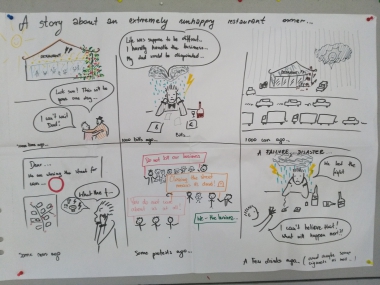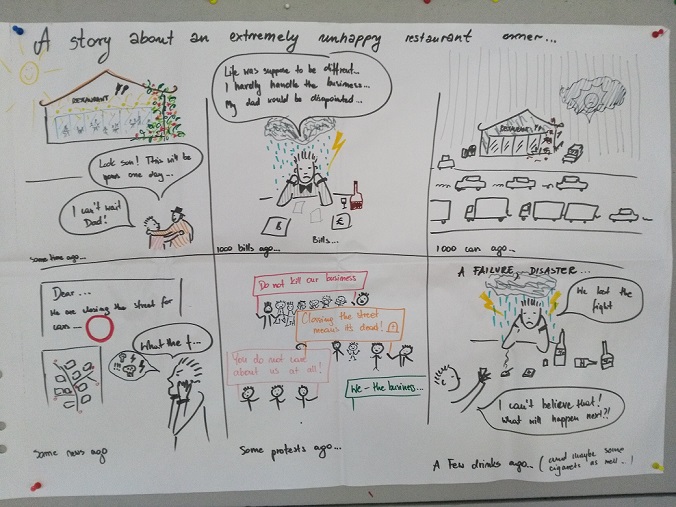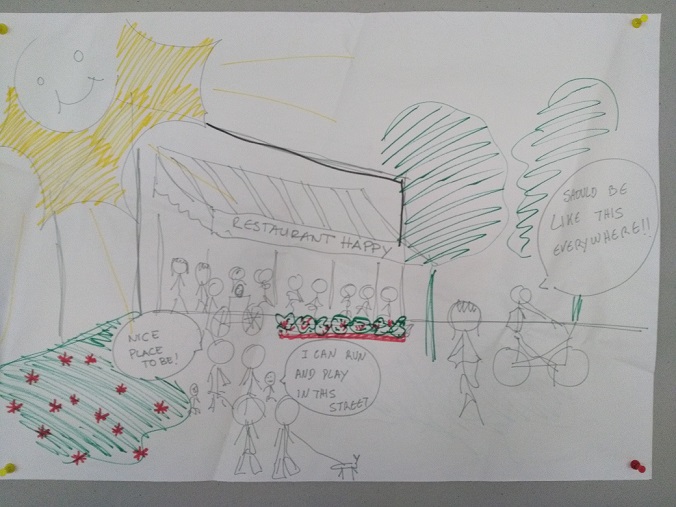Spotlight on story telling – what happens if we close a road to traffic?
Edited on
01 February 2018Quite a few cities are considering the idea of closing a street to traffic. The reasons can be very different like to give space to people strolling, businesses to develop better, neighbourhoods gaining attractiveness, just to mention some. Two points however are mainly common to the task: cut out motorised traffic for the largest part going along with fears, doubts and opposition of concerned people to this. Developing such a measure is therefore a difficult task and might meet reluctance of responsible persons from the very beginning. How to describe and communicate the idea successfully under such conditions?

In the frame of our last seminar in Agii Anargyri & Kamatero exactly this situation was tackled by a work group simulation on developing and communicating such a measure. Work groups needed to develop one measure that one of the cities considers for its integrated action plan. The City of Braga meets exactly the above situation: the plan is to advance public space for access to everybody cutting out any unnecessary traffic. As mentioned, resistance and opposition from both, visitors as well as businesses and inhabitants are almost a certain fact. Then, the task of the work group was not simply to develop the action but to do this by exploiting
- backcasting: describing the result and then thinking on the way to achieve it including barriers and opposition – the main work path to develop the action itself
- Story Telling: putting persons and emotions at the core of the message – the main piece of work to deliver the message to audiences in a positive and convincing way
For the Story Telling, the work group needed to consider some basic elements:
- The story is on a person or a group of persons
- It focuses on one event, action or problem
- It tells the solution, how the problem was avoided or how solving failed
Moreover, the story needs to make people listen, emotionalise them by transferring e.g. joy, trust, fears or threads, convincing them of the idea and bind them to the further development possibly to come! This difficult task was solved excellently by the work group tackling the measure and connected challenges for the road closure in Braga! It goes like this:
- With the promise of a golden future, a son takes over the restaurant from his father, which is well working and well accessible thanks to a major road.
- Some time later – or better a 1000 bills later – and in charge since a long time, the son is disappointed on the job. Things do not work out as he imagined. The business is hardly manageable.
- The road turned to a traffic nightmare, too. Things are looking grey and dark for the poor one.
- To make things even worse, the City announces to close the road – how should customers come to his restaurant now at all??
- In the choice of acceptance or resistance, the son concludes that he needs to resist this “stupid” move of the City! He talks to the other business owners of the road and they organise protests against the road closure: demonstrations are done, the value of the economy is stressed…
- To no use, the road is closed, and the son is left with his friends from the protest despairing now for real: their businesses are left to ruin. And maybe they themselves as well, left to even darker thoughts talking with a few drinks on their sad story.
- But who would believe that the story runs like this? Not us!
- Road closure turned out to be the best thing that happened to the son for a long time. His restaurant prospers: outside areas of his services, playing options for children, no noise, no stinky air, green surroundings: people come to his place to enjoy both: food and the comfortable location!


Surely, the story does not fully reflect the local conditions of any city and some ideas sprang clearly out from the great inspiration and creativity of the work group team, not to mention the excellent drawings.
But as the saying goes: There is a grain of truth in every story!
See German translation here:
See Portuguese translation here:
See Romanian translation here:
Submitted by Olaf Lewald on
